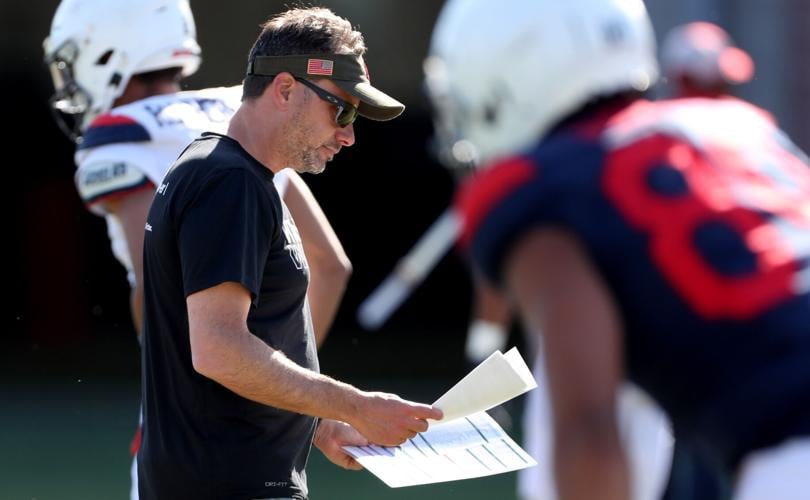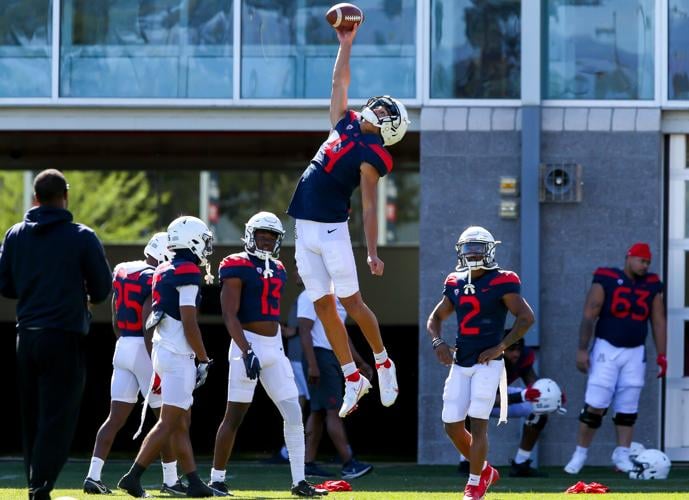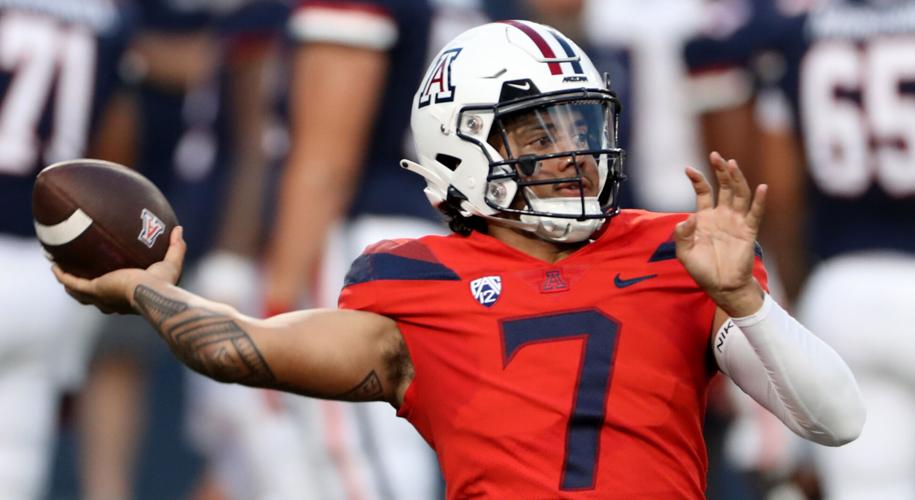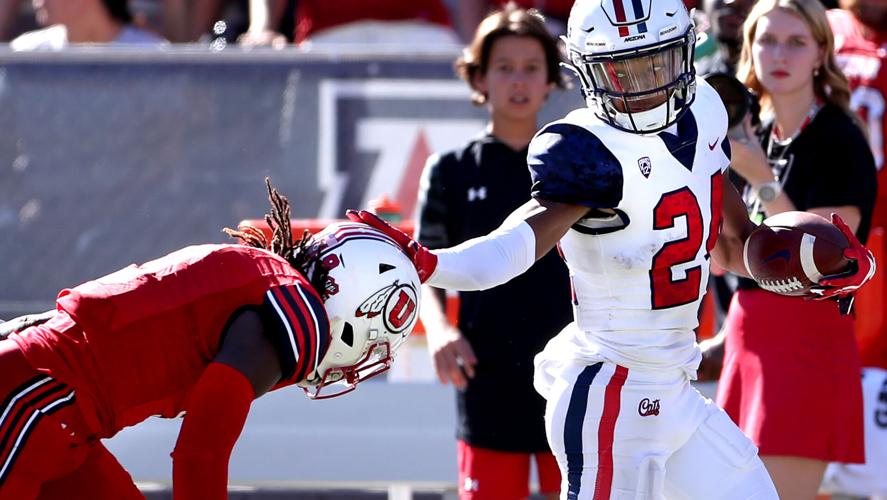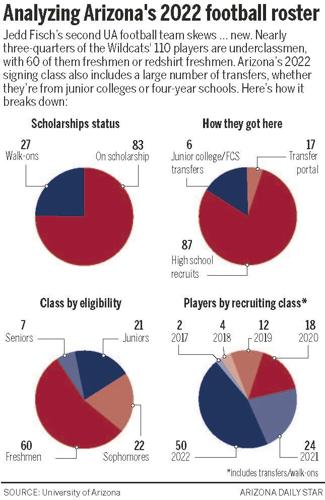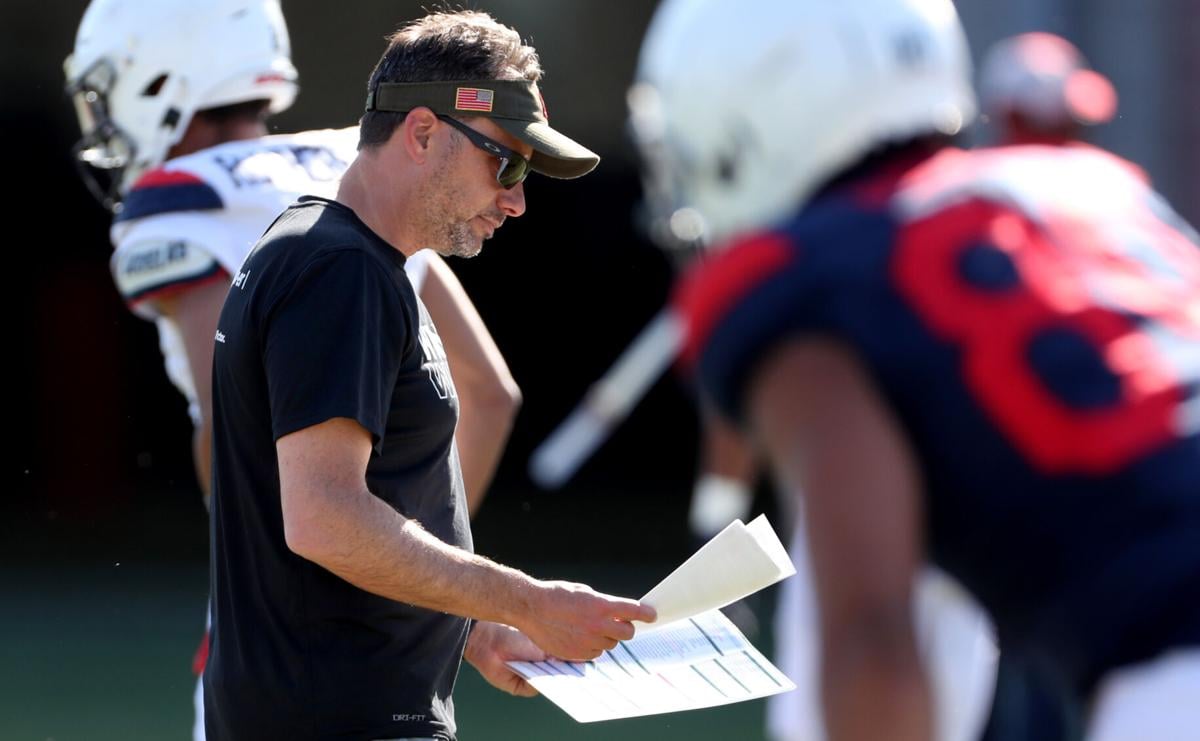Editor's note: This story ran in the Star's college football special section.
Rebuild it, and they will come.
If Jedd Fisch’s multiyear, multistep mission at Arizona could be summed up in six words, it would be those six. The second-year Wildcats coach desperately wants to pack Arizona Stadium. He knows he must produce a consistent winner to make that happen.
Fisch’s options were limited when he officially became Arizona’s head coach on Dec. 23, 2020 — a later-than-normal hiring date spurred by the pandemic. The early signing period had come and gone. Despite not knowing who the next coach would be, 16 players signed letters of intent, filling most of the UA’s available slots.
Fisch faced several tasks simultaneously: hire a staff, including positions for an expanded front office; re-recruit current players who had entered the transfer portal or were considering doing so; and find new players who could upgrade the roster.
With little time to establish relationships with prospects from the Class of 2021, Fisch and his newly arrived staff poured their energy into the transfer portal. By the time the ’21 season started, Arizona had more than a dozen portal additions. The Wildcats signed only two high school players to scholarships who weren’t previously committed to the school: receiver Anthony Simpson and safety Isaiah Taylor.
Those initial moves were merely an appetizer. Over the next year, Fisch would prepare a grand feast.
Since the season-ending loss to Arizona State on Nov. 27, Arizona has added 50 new players. That figure represents 45.5% of the roster. It includes a high school class that 247Sports.com ranked 25th in the country — the Wildcats’ first to crack the top 30 since 2008.
Fisch and his staff acquired all that talent, which also features a portal class ranked 27th nationally by 247Sports.com, despite a 1-11 record in Year 1. Fisch masterfully sold hope and opportunity. He also rebranded last season as Year 0 and has dubbed this one — with all its newness, from the remade roster to the remodeled locker room to the resplendent turf at Arizona Stadium — “the first year of the rebuild.”
None of it has occurred by happenstance.
“There was a lot of skepticism,” Pac-12 Networks analyst Yogi Roth recalled of Fisch’s hiring. “The one thing I continued to hammer home was, ‘He’s got a plan.’
“This wasn’t just, he had a hot season as a play caller or as a coordinator or as a name. No, no, no. Much different. You’ve seen that from the day he got the job — have a plan and execute that plan.
“And then you have to get everybody along for the ride.”
How did Fisch and his staff do it? How did they reshape the course of UA football in a span of 20 months?
With Saturday’s season opener at San Diego State fast approaching, here’s an in-depth look at how Fisch implemented and carried out his plan.
Messaging and buy-in
Fisch took over a team that had hit rock bottom 12 days earlier — a humiliating, disheartening 70-7 loss to rival Arizona State. The defeat capped a winless COVID-19-shortened season (0-5) and extended Arizona’s losing streak to 12 games.
One of the biggest hurdles Fisch faced early on was drumming up enthusiasm — among prospective players and wary fans— for a moribund program. The first thing he did was go to work — hiring coaches, reaching out to players, connecting with alumni, creating a buzz on social media.
“He’s the guy that’s gonna turn over every stone,” running backs coach Scottie Graham said. “Sleep is important, but he doesn’t sleep. I don’t think he does. I think he gets about an hour and a half every day. It makes me go, ‘Did I do enough today to prepare the guys?’”
Fisch inspired Graham, a first-time coach last season, to change his habits. He lost 20 pounds. He read more.
“I try to learn something new every day,” Graham said.
Fisch emphasized the positive aspects of Arizona football, Tucson and anything else he could think of while going about changing the culture of the program. He added “Desert Swarm” legend Tedy Bruschi as a consultant. He got Rob Gronkowski to attend the spring game. He helped raised millions of dollar to remodel the Lowell-Stevens Football Facility.
None of it led to positive results on the field, at least in the win-loss column. But aside from a handful of games (San Diego State, Colorado, Washington State), Arizona competed deep into the second half against everyone on its schedule. The team never stopped playing hard.
“I’m going to steal my colleague and partner Ted Robinson’s line. He always says, ‘When a team loses hope, that’s when change needs to be made.’ That was the biggest challenge,” Roth said.
“He inherited a team that obviously struggled on a bunch of fronts. We jokingly call him ‘Jedd Lasso’ at times, right? There’s something to that.
“He got a team to believe. They didn’t lose hope. If anything, they felt like they could win every game.”
The first wave
Given the timeframe they had to work with and the limited number of scholarships available, Fisch and has staff had only so many options to upgrade the roster entering 2021. They also didn’t have a firm grasp on what they had on hand; only one coach, Chuck Cecil, was retained from the previous regime, and he didn’t have a full-time on-field role under Kevin Sumlin.
The transfer portal provided the best opportunity to acquire players. The staff took a two-pronged approach: address needs and bring local kids back home.
The Wildcats loaded up on front-seven defenders, especially linebackers. They also signed multiple players who had attended high school in Arizona before going to college somewhere else.
The latter was an example of Fisch fulfilling one of his campaign promises: To re-emphasize recruiting within the state. Trust is built when you back up your words with actions.
“He’s done what he said he was going to do,” Roth said.
The additions included one player who satisfied both of the aforementioned criteria: quarterback Gunner Cruz, who played his high school ball in Queen Creek before signing with Washington State.
Fisch inherited a QB room that had only one scholarship player, Will Plummer. Besides Cruz, USF quarterback Jordan McCloud also came aboard.
The three battled deep into August. Cruz won the job, played well in the opener, then faltered. Both he and McCloud eventually suffered season-ending injuries. No one gave Fisch confidence that he could stand pat at the position.
Overall, the portal group proved to be hit-or-miss. Nine players are still with the team. That’s one more than have survived from the class that signed just before Fisch arrived. It shrunk by 50% in about a year and a half.

Wide receiver Tetairoa McMillan jumps up for a one-handed catch while running a drill during spring drills. McMillan, a receiver from Anaheim’s Servite High School, is the gem of Arizona’s 2022 freshman class.
Winners wanted
The staff had more time to plot out the 2022 recruiting class. It also had more information, having met and worked with the returning players.
With steadfast support from the administration, Fisch made key hires beyond the on-field coaches. They included director of strength and conditioning Tyler Owens, who had attended and worked at Alabama, the premier program in the country; director of player personnel Matt Doherty, who previously had worked at North Carolina State, Michigan and Miami; and chief of staff Matthew Hayes, who had a background in athletics, business and tech.
Selling a bold but attainable vision of the future — and placing particular emphasis on the idea of helping make the change happen — Fisch and the staff attacked recruiting. They sought, in the simplest of terms, an elite mix of tangibles and intangibles.
“There’s some cornerstones that he’d want,” Roth said. “Highly competitive people, athletic, stretch the field, explosive plays, physical, not afraid of contact, willing to get dirty, chip on the shoulder.”
In terms of physical traits, size and speed were paramount. That became especially evident during the season, when Arizona struggled to score, especially in the red zone.
The prospects the UA eventually signed included 6-foot-5-inch wide receiver Tetairoa McMillan, the jewel of the class; 6-6 tight end Keyan Burnett; and all-purpose back Rayshon Luke, who had a personal best of 10.32 seconds in the 100-meter dash in high school — and whose nickname is literally “Speedy.”
“I’m hopeful that with speed and size comes points,” Fisch said.
The other theme was pursuing players from winning programs. McMillan and Burnett played for Servite High School in Anaheim, California. So did quarterback Noah Fifita — one of the first five players to commit for 2022 — and linebacker Jacob Manu. Servite advanced to the California Interscholastic Federation Southern Section Division I championship game last season, losing to powerhouse Santa Ana Mater Dei. Arizona also landed two players from that school: defensive linemen Ta’ita’i Uiagalelei and Jacob Kongaika.
“Go find winners,” Fisch said. “Go find guys that have celebrated a lot of victories in locker-room postgames so they know what it feels like to work to get to that point.”

Quarterback Jayden de Laura throws during the Wildcats’ mock game last week. The Washington State transfer gives the Wildcats an experienced and talented starter after injuries to the position decimated the team in 2021.
The QB and the playmaker
McMillan and Luke, both consensus four-star recruits, capped the class and elevated it to a level Arizona hadn’t reached in over a decade. But Fisch and the staff knew they needed more. They knew they needed instant-impact players who could help the Wildcats win more games this year.
No one expects a Rose Bowl berth on the front end of a rebuild. But without some favorable results on the field, the messaging starts to ring hollow.
Arizona needed a replacement for its most productive offensive player, Stanley Berryhill III, who also excelled on special teams. It might have acquired an upgrade.
Everyone wanted UTEP receiver Jacob Cowing after he entered the transfer portal. The Wildcats got him.
Good fortune played something of a role: Cowing prepped at Maricopa High School and has a young son who lives in the Chandler-Gilbert area.
A late bloomer, Cowing went from lightly recruited two-star high school prospect to sought-after four-star portal player. He caught 69 passes for 1,354 yards and seven touchdowns last season. He would have led Arizona in the latter two categories by a wide margin.
“Jacob Cowing was the biggest get of the offseason for the football team,” Fisch said.
He made that statement knowing that other newcomers included McMillan, the Wildcats’ highest-rated recruit of the modern era, and transfer quarterback Jayden de Laura. It wasn’t meant to diminish de Laura’s importance in any way. If Cowing was Portal Pickup 1A, de Laura was 1B.
Players of de Laura’s caliber don’t often come on the market when they’ve enjoyed early success. In his second season at Washington State, de Laura passed for 2,798 yards and 23 touchdowns. He was named Pac-12 Offensive Freshman of the Year.
But WSU was undergoing staff changes. On Dec. 8, the Cougars hired Eric Morris as their offensive coordinator. Morris had been the head coach at Incarnate Word. The next day, Incarnate Word’s breakout quarterback, Cameron Ward, entered the transfer portal. About a month later, he signed with Washington State.
Fisch had seen first-hand how good de Laura could be: He passed for a career-high four touchdowns against Arizona on Nov. 19. When he popped into the portal in early January, the UA staff pounced. De Laura could provide certainty at a critical spot where instability proved ruinous in 2021.
“The quarterback position is where everything starts and stops when it comes to a football team,” Fisch said.
“Everything gets better,” Roth said, “when that position is right.”

By the end of the 2021 season, Dorian Singer — a freshman walk-on — had developed into one of the Wildcats’ top offensive threats.
Working the margins
De Laura, Cowing, McMillan and others are “difference-maker type players,” Roth said.
But Fisch and his staff haven’t focused solely on obtaining marquee talent. They also have worked relentlessly to improve the roster from the bottom up.
Arizona’s additional signees back in February 2021 included walk-on Ammon Allen, an athletic safety from Gilbert who had multiple scholarship offers but none from a Power Five school. Allen earned a scholarship this summer and has developed into a rotation player at linebacker.
Three-star receiver Dorian Singer slipped through the cracks in the 2021 recruiting cycle. He came to Arizona as a walk-on that summer. He was starting by the end of the season and earned a scholarship in January.
Kongaika was relatively under-recruited. But one of his offers came from UCLA, where Johnny Nansen and Jason Kaufusi coached the Bruins’ defensive front. They’re now at Arizona. So is Kongaika, who signed with the UA as a walk-on in February and already has attained scholarship status.
Receiver Rex Haynes had been committed to Colorado State. He also had an offer from Arizona State, where his father, Hall of Fame cornerback Mike Haynes, once played. But the younger Haynes decided he’d rather walk on at Arizona, providing the Wildcats with another three-star prospect with a 6-4 frame.
The theory behind the never-ending pursuit of personnel is that even incremental improvements at the bottom of the roster make a difference in the overall competitive environment. It’s been noticeable on the practice field.
“This team is bigger. This team is faster. This team is stronger,” defensive line coach Ricky Hunley said.
This team is different. Sixty-six players on the current roster — 60% — came aboard after Fisch was hired.
“It’s night and day,” cornerbacks coach DeWayne Walker said, “from the enthusiasm, the money that he’s raised, the recruiting, what we’ve done in this short amount of time of just trying to put the pieces together.”
And if those pieces fit together? Arizona Stadium could become Fisch’s field of dreams.



